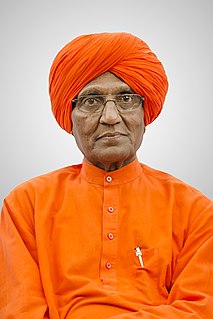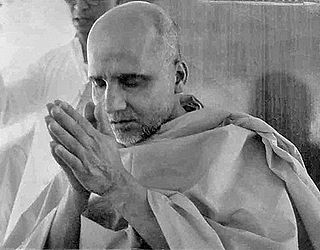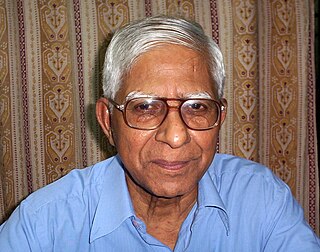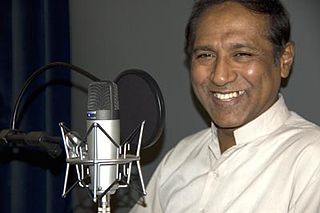 W
WAbhinavagupta was a philosopher, mystic and aesthetician from Kashmir. He was also considered an influential musician, poet, dramatist, exegete, theologian, and logician – a polymathic personality who exercised strong influences on Indian culture.
 W
WAgnivesh, referred to as Swami Agnivesh, was an Indian social activist and the founder of Arya Sabha, a political party based on the principles of Arya Samaj. He also served as a cabinet minister in the state of Haryana. He is best known for his work against bonded labour through the Bonded Labour Liberation Front, which he founded in 1981.
 W
WSwami Ashokananda, born as Yogeshchandra Dutta, was a disciple of Swami Vivekananda of India and a monk of the Ramakrishna Math. From 1932 until his death in December 1969 at the age of 76 he was in charge of the Vedanta Society of Northern California, San Francisco.
 W
WAbul Kalam Ghulam Muhiyuddin Ahmed bin Khairuddin Al-Hussaini Azad pronunciation (help·info) was an Indian scholar, Islamic theologian, independence activist, and a senior leader of the Indian National Congress during the Indian independence movement. Following India's independence, he became the First Minister of Education in the Indian government. He is commonly remembered as Maulana Azad; the word Maulana is an honorific meaning 'Our Master' and he had adopted Azad (Free) as his pen name. His contribution to establishing the education foundation in India is recognised by celebrating his birthday as National Education Day across India.
 W
WVinayak Narahari "Vinoba" Bhave was an Indian advocate of nonviolence and human rights. Often called Acharya, he is best known for the Bhoodan Movement. He is considered as a National Teacher of India and the spiritual successor of Mohandas Gandhi. He was an eminent philosopher. The Gita has also been translated into Marathi language by him with the name as Geetai means mother Geeta.
 W
WDoddabele Lakshmi Narasimhachar was a Kannada linguist, grammarian, lexicographer, writer, literary critic and editor who taught at the Department of Kannada Language Studies, University of Mysore between 1932 - 1962. His knowledge of Halegannada helped him in reading ancient epigraphic records. He authored four books in Kannada, edited about nine volumes, penned eleven prefaces, wrote nearly hundred articles across three decades, seven monographs in English and outlined introductions to four Kannada works. He presided over the forty first Kannada Sahitya Sammelan held at Bidar in 1960. He was the recipient of the Kannada Rajyotsava Award from the Mysore State. In 1969, his alma mater - University of Mysore bestowed on him an Honorary Doctorate in recognition of a lifetime contribution to the world of Kannada studies.
 W
WBaba Hari Dass, born in Almora near Nainital, Uttar Pradesh, India, was a yoga master, a silent monk, and a commentator of Indian scriptural tradition of Dharma and Moksha. He was classically trained in Ashtanga Yoga – Raja Yoga of Patanjali, as well as Kriya Yoga, Ayurveda, Samkhya, Tantra Yoga, Vedanta, and Sanskrit.
 W
WBede Griffiths OSB Cam, born Alan Richard Griffiths and also known by the end of his life as Swami Dayananda, was a British-born priest and Benedictine monk who lived in ashrams in South India and became a noted yogi. Griffiths was a part of the Christian Ashram Movement.
 W
WShri Samartha Sadaguru Ganapatrao Maharaj Kannur (1909–2004) was an Indian guru in the Inchegeri Sampradaya.
 W
WMar Emmanuel Nidhiri (1842–1904) was a significant figure in the history of the Syrian Malabar Nasrani church in Kerala. He led the community against the European hegemony over the Saint Thomas Christians. He was the undisputed leader acceptable to the factions in Kerala church. He was the second Vicar General of Syro-Malabar Catholic Church.
 W
WSwami Krishnananda Saraswati was a disciple of Sivananda Saraswati and served as the General Secretary of the Divine Life Society in Rishikesh, India from 1958 until 2001. Author of more than 40 texts, and lecturing extensively, on yoga, religion, and metaphysics, Krishnananda was a prolific theologian, saint, yogi and philosopher.
 W
WKurien Kunnumpuram S.J. was a Roman Catholic, Indian Jesuit priest and well-known Christian theologian. A member of the academic staff of the Faculty of Theology at Jnana-Deepa Vidyapeeth (JDV), Pune (India) (Emeritus), he contributed in the field of ecclesiology, particularly with regard to Vatican II.
 W
WSwami Madhavananda, the ninth President of the Ramakrishna Math and Ramakrishna Mission, was born on Saturday, 15 December 1888 at Baghanchra in Nadia district of West Bengal. His pre-monastic name was Nirmal Chandra Basu. His father was Hariprasad Basu. He graduated from the University of Calcutta with distinction. During his student life he read the works of Vivekananda and was inspired by the ideals and message of Ramakrishna and Vivekananda. He was initiated by the Holy Mother at Jayrambati in March 1909. He joined the monastery at Chennai in January 1910. He was initiated into sannyasa by Brahmananda in January 1916. Later, his younger brother Vimal also joined the Order and came to be known as Swami Dayananda. He founded Ramakrishna Mission Seva Pratishthan in Kolkata in 1932.
 W
WVenerable Sikkim Mahinda, commonly known as S. Mahinda, was a Buddhist monk from the state of Sikkim. He was a poet and author, and participated in the Sri Lankan independence movement. Although he was from Sikkim, he identified himself as a Tibetan, presumably because it was more well known in Ceylon.
 W
WPhirozshah Dorabji Mehta was an Indian-born writer and lecturer on religious topics. He also had many other interests including astronomy, poetry and philosophy.
 W
WKuruvilla Pandikattu is an Indian Jesuit priest and Professor of Philosophy, Science and Religion at Jnana-Deepa Vidyapeeth: Institute of Philosophy and Religion, Pune, Maharashtra, India. He is also Director of JDV Centre for Science-Religion Studies (JCSR) and Association of Science, Society and Religion (ASSR), Pune.
 W
WNathuram Premi was a writer, publisher, poet, editor, and linguist in the field of Jainism as well as Hindi literature. A budding poet, he wrote under the nom de plume of "Premi". Although belonging to the Digambara sect of Jainism, he adopted a non-sectarian attitude and published and translated many Digambara as well as Śvetāmbara works. Working as a clerk in a firm in Mumbai he rose to establish his own publishing house and bookstore Hindi Granth Ratnākar Kāryālay which published works of many of the biggest names in Indian literature, including Munshi Premchand, Hajariprasad Dvivedi, Jainendrakumar, Yashpal, Swami Satyabhakta, Sharatchandra Chatterjee and Rabindranath Tagore. The bookshop and publishing house now called Hindi Granth Karyalay is now being managed by his grandson and great-grandson 100 years after its establishment.
 W
WRam Puniyani is a former professor of biomedical engineering and former senior medical officer affiliated with the Indian Institute of Technology Bombay. He began his medical career in 1973 and served IIT in various capacities for 27 years, beginning 1977. In December 2004, he took voluntary retirement to work full-time for what has been stated by some as "communal harmony" in India. He is involved with human rights activities and initiatives to oppose something which some see as "the rising tide of fundamentalism in India".
 W
WJerry Rosario is an Indian Jesuit priest, a theologian, a pastor, spiritual counselor, a writer, a social activist, a motivator, a civil lawyer, a retreat- facilitator. And also, founder - director of 4 - movements
 W
WSwami Dayananda Saraswati was a renunciate of the Hindu order of sannyasa and a renowned traditional teacher of Advaita Vedanta, and founder of the Arsha Vidya Gurukulam. He was the spiritual Guru of prime minister Narendra Modi.
 W
WSondekoppa Srikanta Sastri was an Indian historian, Indologist, and polyglot. He authored about 12 books, over two hundred articles, several monographs and book reviews over four decades in English, Kannada, Telugu and Sanskrit. To his credit are such works as "Sources of Karnataka History", "Geopolitics of India & Greater India", "Bharatiya Samskruthi" and "Hoysala Vastushilpa". S. Srikanta Sastri was a polyglot well versed in fourteen languages spanning Greek, Latin, Pali, Prakrit, Sanskrit and German among others. He was Head of the Department of History & Indology at Maharaja College, University of Mysore between 1940 - 1960. He was conferred the Kannada Literary Academy award in 1970 and was subsequently honoured by Governor of Karnataka Mohanlal Sukhadia in 1973 during mythic society diamond jubilee function. A Festschrift was brought forth and presented to him during his felicitation function in 1973 titled "Srikanthika" with articles on History and Indology by distinguished scholars. His work on Indus Valley Civilization and town planning at Harappa and Mohenjodaro were published in successive articles and drew considerable attention. His Research articles on The Aryan Invasion theory, the date of Adi Sankaracharya, Oswald Spengler's view on Indian Culture, Jaina Epistemology, Proto-Vedic religion of Indus Valley Civilization and Evolution of the Gandabherunda insignia remain relevant today.
 W
WSirdar Kapur Singh, ICS was an eminent Sikh philosopher, theologian, politician-parliamentarian, and a prolific writer of the twentieth century. As a distinguished linguist he had a mastery over English, Gurmukhi, Persian, Arabic and Sanskrit.
 W
WKaran Singh is an Indian politician, philanthropist and poet. He belongs to Jamwal Dogra Dynasty is the son of Maharaja Hari Singh, and was born in Cannes, France. From 1947 he worked closely, as a teenager, with Jawaharlal Nehru, and Sardar Patel during the founding of the Republic of India, and in 1967 became the youngest ever union cabinet minister in the government of Indira Gandhi. He was the Prince regent of Jammu and Kashmir until 1952. Following which at age 21 years old, Karan Singh served as the first President of Jammu and Kashmir from 1952 to 1965.
 W
WRevd. Valson Thampu is an Indian educator, Christian theologian, who was the Principal of St Stephen's College, University of Delhi, Delhi, from 2008 to February 2016. Prior to this he was a lecturer at the college and its officiating principal since May 2007. He is a translator from Malayalam to English and his translation of The Scent of the Other Side won the Crossword award. His second translated work, Gift in Green was published by HarperCollins in 2011.
 W
WSwami Vivekananda, born Narendranath Datta, was an Indian Hindu monk. He was a chief disciple of the 19th-century Indian mystic Ramakrishna. He was a key figure in the introduction of the Indian philosophies of Vedanta and Yoga to the Western world, and is credited with raising interfaith awareness, bringing Hinduism to the status of a major world religion during the late 19th century. He was a major force in the revival of Hinduism in India, and contributed to the concept of Indian nationalism as a tool to fight against the British empire in colonial India. Vivekananda founded the Ramakrishna Math and the Ramakrishna Mission. He is perhaps best known for his speech which began with the words "Sisters and brothers of America ...," in which he introduced Hinduism at the Parliament of the World's Religions in Chicago in 1893.